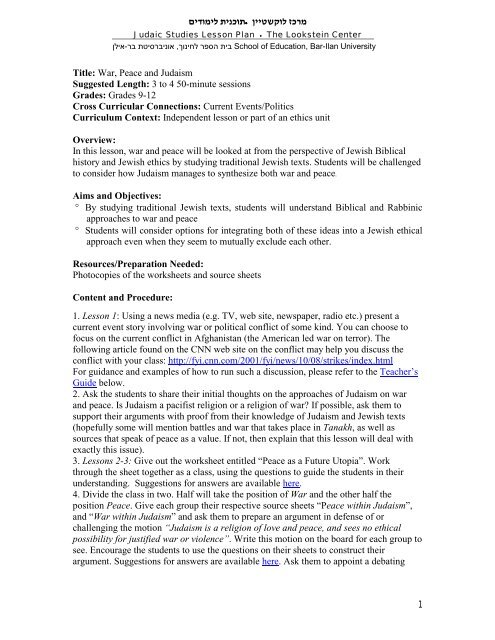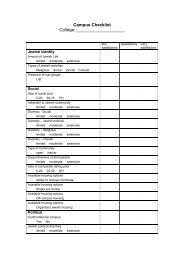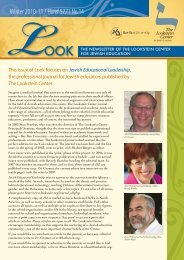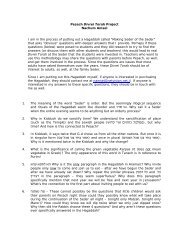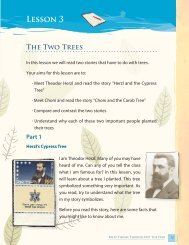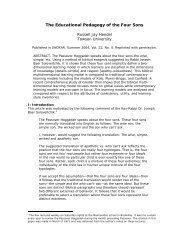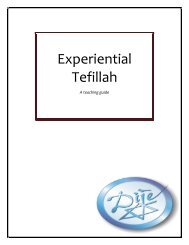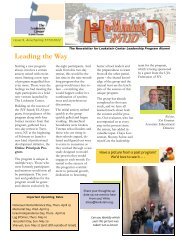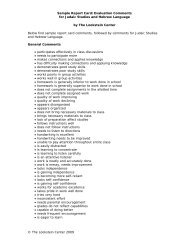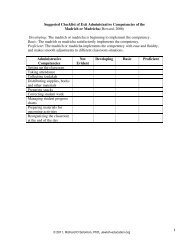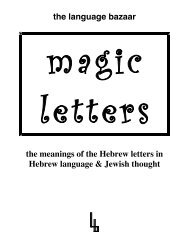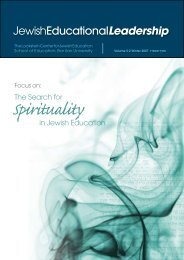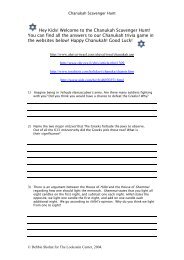Official Lesson plan Template - The Lookstein Center for Jewish ...
Official Lesson plan Template - The Lookstein Center for Jewish ...
Official Lesson plan Template - The Lookstein Center for Jewish ...
- No tags were found...
Create successful ePaper yourself
Turn your PDF publications into a flip-book with our unique Google optimized e-Paper software.
מרכז לוקשטיי* •תוכנית לימודי!Judaic Studies <strong>Lesson</strong> Plan • <strong>The</strong> <strong>Lookstein</strong> <strong>Center</strong>School of Education, Bar-Ilan University בית הספר לחינוך, אוניברסיטת בר-אילןTitle: War, Peace and JudaismSuggested Length: 3 to 4 50-minute sessionsGrades: Grades 9-12Cross Curricular Connections: Current Events/PoliticsCurriculum Context: Independent lesson or part of an ethics unitOverview:In this lesson, war and peace will be looked at from the perspective of <strong>Jewish</strong> Biblicalhistory and <strong>Jewish</strong> ethics by studying traditional <strong>Jewish</strong> texts. Students will be challengedto consider how Judaism manages to synthesize both war and peace.Aims and Objectives:° By studying traditional <strong>Jewish</strong> texts, students will understand Biblical and Rabbinicapproaches to war and peace° Students will consider options <strong>for</strong> integrating both of these ideas into a <strong>Jewish</strong> ethicalapproach even when they seem to mutually exclude each other.Resources/Preparation Needed:Photocopies of the worksheets and source sheetsContent and Procedure:1. <strong>Lesson</strong> 1: Using a news media (e.g. TV, web site, newspaper, radio etc.) present acurrent event story involving war or political conflict of some kind. You can choose tofocus on the current conflict in Afghanistan (the American led war on terror). <strong>The</strong>following article found on the CNN web site on the conflict may help you discuss theconflict with your class: http://fyi.cnn.com/2001/fyi/news/10/08/strikes/index.htmlFor guidance and examples of how to run such a discussion, please refer to the Teacher’sGuide below.2. Ask the students to share their initial thoughts on the approaches of Judaism on warand peace. Is Judaism a pacifist religion or a religion of war? If possible, ask them tosupport their arguments with proof from their knowledge of Judaism and <strong>Jewish</strong> texts(hopefully some will mention battles and war that takes place in Tanakh, as well assources that speak of peace as a value. If not, then explain that this lesson will deal withexactly this issue).3. <strong>Lesson</strong>s 2-3: Give out the worksheet entitled “Peace as a Future Utopia”. Workthrough the sheet together as a class, using the questions to guide the students in theirunderstanding. Suggestions <strong>for</strong> answers are available here.4. Divide the class in two. Half will take the position of War and the other half theposition Peace. Give each group their respective source sheets “Peace within Judaism”,and “War within Judaism” and ask them to prepare an argument in defense of orchallenging the motion “Judaism is a religion of love and peace, and sees no ethicalpossibility <strong>for</strong> justified war or violence”. Write this motion on the board <strong>for</strong> each group tosee. Encourage the students to use the questions on their sheets to construct theirargument. Suggestions <strong>for</strong> answers are available here. Ask them to appoint a debating1
מרכז לוקשטיי* •תוכנית לימודי!Judaic Studies <strong>Lesson</strong> Plan • <strong>The</strong> <strong>Lookstein</strong> <strong>Center</strong>School of Education, Bar-Ilan University בית הספר לחינוך, אוניברסיטת בר-אילןteam of three students (ensuring that all students in the group are still involved inpreparation of the argument).5. Chair the debate. Ask each team to make a three-minute presentation making specificreferences to their sources. <strong>The</strong>n give each group (preferably students that haven’t spokenyet) two minutes to decide which questions they will ask the other side. <strong>The</strong>n ask them topose them, and ask the groups to defend their positions once again.6. Ask the students what they really feel on these issues and facilitate any discussion thatfollows.7. <strong>Lesson</strong> 4: Finally, give out the sheets entitled “A time <strong>for</strong> war and a time <strong>for</strong> peace”and go through them with the class. Conclude the discussion by explaining to the classthat although the ideal is to have a world without war and violence, that is not the reality,and there<strong>for</strong>e Judaism must integrate war and peace into its system of ethics, until we canreach that utopia.2
מרכז לוקשטיי* •תוכנית לימודי!Judaic Studies <strong>Lesson</strong> Plan • <strong>The</strong> <strong>Lookstein</strong> <strong>Center</strong>School of Education, Bar-Ilan University בית הספר לחינוך, אוניברסיטת בר-אילןAsk the students: What do they think the ‘rights’ and ‘wrongs’ of this conflict are andwho is perpetrating them?This question will no doubt generate some debate. It is important that there is somedebate and that different voices are heard. Although no doubt everyone will agree that theterrorist acts of September 11 th were “wrong” it is healthy <strong>for</strong> there to be some debateabout the rights and wrongs of the conflict in Afghanistan. Some opinions to look out <strong>for</strong>:1. America has the “right” of self-defense and there<strong>for</strong>e to initiate a conflict inAfghanistan.2. <strong>The</strong> Taliban has the “right” to self-defense and there<strong>for</strong>e to refuse to surrender.3. It is “right” to wage war on terrorism.4. It is “wrong” to kill innocent Afghan civilians.5. It is “wrong” <strong>for</strong> America to become involved in a conflict outside of its ownterritory.6. It is “right”/”wrong’<strong>for</strong> America/the allies to replace the Taliban government andput a replacement one in power7. It is “right”/”wrong” <strong>for</strong> America to risk its own citizens or the citizens ofAfghanistan <strong>for</strong> a war of ideology/self-defense8. It is “right”/”wrong” <strong>for</strong> America to embark on a war of revenge <strong>for</strong> theSeptember terrorist attacksYou may wish to ask the class if there was ever a legitimate and moral war? If so, is thisan example?<strong>The</strong>re may be students who consider themselves pacifists and there<strong>for</strong>e suggest there isno such thing as a legitimate conflict, and if there are none in your class, it may beworthwhile explaining that such an opinion exists. It is more likely that students will stateopinions such as wars of self-defense are legitimate, war against terrorism and evilregimes such as the Taliban are acceptable. It is also possible that some students willsuggest that this war is one of ideologies, or revenge, and these are not good enoughreasons to sacrifice innocent civilians etc.Write the following list of values/issues on the board and ask the students to evaluate theplace that they do or do not have in this conflict.Value of lifePolitical ideologiesKilling innocents in order to destroy a regime that threatens the death of many moreinnocent peopleRight of self-defenseMorality of conscriptionConscientious objectors<strong>The</strong> role of God and religion in war and politics<strong>The</strong> value of peace and when it should be compromisedPeaceNationalism4
מרכז לוקשטיי* •תוכנית לימודי!Judaic Studies <strong>Lesson</strong> Plan • <strong>The</strong> <strong>Lookstein</strong> <strong>Center</strong>School of Education, Bar-Ilan University בית הספר לחינוך, אוניברסיטת בר-אילן<strong>The</strong> value of life is found at all levels of this conflict, from the lives that were lost onSeptember 11 th to the lives of the American servicemen fighting this conflict, to the livesof the Afghan civilians, as well as the lives of the Taliban and Al Qua’eda fighters. <strong>The</strong>students have to decide whether values of life is an over-riding value that de-legitimizesthis conflict, or whether the Taliban/Al Qua’eda have <strong>for</strong>gone their right to life, and theother values involved such as right to self-defense, or political ideologies are moreimportant than the risk to the lives of American servicemen and Afghan civilians. <strong>The</strong>same debate can be had with the value of peace, and each group’s right to live in peace,and right to shatter someone else’s peace. Further to this debate we can consider the rightto self-defense. Does America have the right to self-defense at the cost of other lives, anddoes the Taliban/Al Qua’eda also have the right to self-defense?<strong>The</strong> role of God in conflict is a sensitive issue to explore. Both sides feel that they haveGod on their side, and many students may feel uncom<strong>for</strong>table with using God to justify aconflict. Students should be able to see that both sides are using similar values to fightthis conflict, such as God, morality and justice. Can and should the student relates to bothsides, or only their own? Are there fundamental differences between the way the sidesuse these values?Ask the students which of these are values contained in the Torah/Judaism, and what theythink Judaism would say about this conflict.Finally, the students should see that many of the ethical values that are being spoken of inthe context of this conflict are values contained in the Torah and in Judaism. Such valuesas peace, value of life, the role of God, the right to self-defense and the right to fight <strong>for</strong>an ideology are all ideas that the students will be exploring <strong>for</strong> the rest of the lesson.5
מרכז לוקשטיי* •תוכנית לימודי!Judaic Studies <strong>Lesson</strong> Plan • <strong>The</strong> <strong>Lookstein</strong> <strong>Center</strong>School of Education, Bar-Ilan University בית הספר לחינוך, אוניברסיטת בר-אילןSource 1: Yeshayahu 2:1-4PEACE AS A UTOPIA WORKSHEET1. In verse 3 this source speaks of many people recognizing God, and worshippingHim. Which people do you think Isaiah is speaking of?One way of interpreting this source is that the people are the nations of the world,and the utopia described will be achieved when all people come to commit to thevalues of ethical monotheism (not necessarily Judaism). This approach can introducethe debate of the role that the <strong>Jewish</strong> people can play as a “light unto the nations” inbringing about this religious and moral renaissance.2. Explain the allegory of verse 4.<strong>The</strong> tools that have until now been used <strong>for</strong> war and destruction can be used <strong>for</strong>peaceful activities, such as food production. A contemporary reading of this textwill bring us to question the billions of dollars spent by governments on weaponsof mass destruction, while there is starvation and poverty in many places in theworld.3. This source speaks of a messianic utopian future. What two things does Isaiah saywill be central to this time?1. A universal recognition of ethical monotheism by the nations of world and arecognition of God and Judaism by Jews. 2. An era of world peace where nations willno longer wage war on each other.Source 2: Yeshayahu 11:6-94. Continuing this theme, what else does Isaiah describe will happen when theMessiah comes?All creatures of violence and power will no longer dominate and destroy weakerspecies. <strong>The</strong>re will be a universal peace.5. In your opinion, is this allegorical or literal?You may want to mention to your students that Maimonides and Nachmanidesdisagree about this interpretation. Nachmanides says that during the messianic erathe rules of nature will be suspended, and the things described in this source willactually take place. Predators and their prey will sit together in peace. Maimonidesdisagrees and suggests that this is allegory <strong>for</strong> nations and people. Strong powerfulnations will no longer try and destroy weaker nations, and world peace will be6
מרכז לוקשטיי* •תוכנית לימודי!Judaic Studies <strong>Lesson</strong> Plan • <strong>The</strong> <strong>Lookstein</strong> <strong>Center</strong>School of Education, Bar-Ilan University בית הספר לחינוך, אוניברסיטת בר-אילןachieved. Maimonides is of the opinion that messianic times will be achieved throughnatural means, and that the laws of nature will apply as be<strong>for</strong>e.Source 3: <strong>The</strong> United Nations Charter6. <strong>The</strong> United Nations buildings in New York are adorned with a quote from Source 1above. How does its charter compare to the vision that Isaiah describes?7. Do you think they are fulfilling their charter?8. What do you think Jews must do to bring about the fulfillment of Isaiah’s prophecies?Do you think they are doing all they should?<strong>The</strong>se questions of analysis are subjective and are designed to trigger a thinkingprocess aiming to allow the student to see the biblical texts in a contemporarycontext.Source 1PEACE WITHIN JUDAISAM WORKSHEET1. What does Hillel mean when he says that “the world stands” on these three values?Without these three values the world would not be able to exist. This could mean that thespiritual/metaphysical impact of these values being absent would be so devastating thatthe world would cease to exist. It is more likely that Hillel meant that without these threevalues, society would not be able to function. For people to live and interact, these threevalues are necessary, or society would fall into chaos, like those biblical societies thatwere destroyed by God (Generation of the flood, Sodom and Gomorrah, etc.).2. Why do you think he has chosen these three? Would you choose differently?Without these three values governing citizens, society would collapse since these valueshelp man live side by side with his neighbor. It may be interesting to note that as withmany groupings of ‘threes’ in talmudic sources, each one represents a type ofrelationship that man has: man and man, man and God, and man and himself (e.g. thethree cardinal sins, repentance, charity and prayer that change God’s decree on YomKippur, etc.). Truth governs the relationship between man and God, man needs to knowin himself that there is justice in this world, and finally peace is an ultimate value thatgoverns the way we relate to our fellow man.3. Can you think of situations where these values conflict with each other?<strong>The</strong>se three will often be found in conflict in the real world. Sometimes, as in sources 3-9,the truth of the Torah and Mitzvot need to be compromised <strong>for</strong> the sake of peace. God is7
מרכז לוקשטיי* •תוכנית לימודי!Judaic Studies <strong>Lesson</strong> Plan • <strong>The</strong> <strong>Lookstein</strong> <strong>Center</strong>School of Education, Bar-Ilan University בית הספר לחינוך, אוניברסיטת בר-אילןoften said to waive His right to act according to justice in order to maintain peace (i.e.not punishing Israel when they deserve to be punished).4. If you had to choose one above the others, which would it be?Out of the three types of relationships, those between man and man are the most pressing,filling our every day reality. <strong>The</strong>re<strong>for</strong>e, the value that governs these relationships – peace– becomes the most relevant and important. <strong>The</strong>oretically it may not be so, butpractically, these sources suggest that it must be so. Having said that, this questionallows the students to use their own powers of reason and thought, and as long as theycan justify their answer, there can be no incorrect approach.Source 25. Why is Aaron an example of a ‘lover of peace’? Can you bring proof from yourknowledge of Aaron in the Midrash?In midrashic sources, Aaron is seen as the ultimate lover of peace, often investing histime and energy in bringing people together.6. What is the difference between loving peace and pursuing peace?Loving peace is a theoretical value and ideology, but pursuing it shows a commitment toactually achieving it, even at personal cost (time, money and energy). Aaron was not justa talker on this subject, but he actually went about achieving his goals.7. Are the values of loving/pursuing peace and loving people, and bringing them back tothe Torah connected in any way?All of these values are grounded on a love of humanity and fellow man. Aaron lovedpeace because he loved his fellow man. This is the same reason that he wished to bringthem close to the Torah. A person who believes that Torah and Judaism represent theideal lifestyle may try to convince the people he cares <strong>for</strong> that they should follow thislifestyle. So too, will a peace-loving man try to bring peace into the lives of his fellowman.Source 3-98. In these 6 sources, peace is presented as an ultimate value above many other values. Doyou agree? Can you think of a value that is more important than peace?9. Why do you think that source 3 suggests that peace is more important than all the otherMitzvot?8
מרכז לוקשטיי* •תוכנית לימודי!Judaic Studies <strong>Lesson</strong> Plan • <strong>The</strong> <strong>Lookstein</strong> <strong>Center</strong>School of Education, Bar-Ilan University בית הספר לחינוך, אוניברסיטת בר-אילן<strong>The</strong>se two questions are similar to questions 2-4, and should be approached in the sameway. <strong>The</strong> aim is to further encourage students to approach peace as a value that canoften be in conflict with other values or concepts, and to evaluate whether it always takespriority over other values.10. Source 6 suggests that Israel merited receiving the Torah because they are a people ofpeace. Would you say this to be true? Explain your answer.For the students to evaluate, and decide. Concepts that could be considered are the rolethe <strong>Jewish</strong> people play at the moment in the world, including in Israel, the way the worldperceives the <strong>Jewish</strong> people, and the role and responsibility that the <strong>Jewish</strong> people haveto take in the context of bringing messianic times closer (i.e. a light unto the nations etc.).Source 1WAR WITHIN JUDAISM WORKSHEETPart 1 – verses 1-4 – <strong>The</strong> role of God and religion in warfare1. Why do you think it is the kohen that is addressing the people on this matter, and why ishe speaking about God and the Exodus in the context of war?<strong>The</strong> kohen is a spiritual leader who represents God to the people, and the people to God.It is there<strong>for</strong>e fitting that it is he who is speaking to the people on the issue of God’s rolein war. <strong>The</strong> kohen is in a position to convince the people of God’s role (protector andfighter on behalf of His people). <strong>The</strong> kohen promises the people that God is with themand they will there<strong>for</strong>e be successful. Just as God was victorious over the Egyptians andsuccessfully took the people out of slavery (the only previous military victory that theyhad at this time as a point of reference), so He will ensure victory in any future war. Thisis both designed to ease any fear of defeat and death that the people have, but also toremind them that not only do they have God on their side, but the upper moral hand, asthe war they are about to fight is one sanctioned by God.Part 2 – verses 5-9 – Those not fit <strong>for</strong> war2. Who is speaking to the people now? What do you think their role is? Why doesn’t thekohen continue with this topic?<strong>The</strong> kohen has completed his discourse on the theology of war, and there<strong>for</strong>e ends hisspeech. <strong>The</strong> officers were military leaders, who now address the people on the militarymatter of conscription.3. Which categories of people are exempt from conscription? Why do you think this is?9
מרכז לוקשטיי* •תוכנית לימודי!Judaic Studies <strong>Lesson</strong> Plan • <strong>The</strong> <strong>Lookstein</strong> <strong>Center</strong>School of Education, Bar-Ilan University בית הספר לחינוך, אוניברסיטת בר-אילן<strong>The</strong> following people are exempt from conscription: One who has built a new house,<strong>plan</strong>ted a vineyard, or betrothed a wife, one who has yet to have enjoyed use of newacquisition, and one who is scared to fight. <strong>The</strong>se exemptions can either be approachedfrom an ethical point of view (i.e. that it is not fair or moral to <strong>for</strong>ce someone in any ofthese situations to have to leave their home, vineyard or wife and fight, or to <strong>for</strong>cesomeone who is scared to the front line) or a practical point of view. On a practicallevel, the men listed are less likely to be good soldiers, as their minds may be elsewhere,and not totally focused on the task at hand. <strong>The</strong>y may be a liability in a war situation, andare there<strong>for</strong>e exempt from fighting. In the case of the soldier who is scared to fight, thetext suggests that we are worried that he may influence thesoldiers around him, which is a much more pressing concern, and there<strong>for</strong>e the Torahexempts him immediately.4. Do you think that a conscientious objector is included in any of these categories? If so,which one? If not, do you think they were also exempt? Do you think there was such athing as a conscientious objector in biblical warfare?It is very difficult to include a conscientious objector in any of the categories above.<strong>The</strong>re is no record of someone who was against serving in an army commanded by God,perhaps because it is hard to question a war that has been commanded by God. (Maybewe can say that Avraham was the first conscientious objector as he argued with Godagainst destroying the cities of Sodom and Gomorrah. However, there he was notobligated to be involved in the destruction so it is not a complete analogy).Part 3 – verses 10-18 – Peace treaties and the Seven Canaanite Nations5. Why do you think the Israelite army is commanded to subjugate a people that havemade a peace treaty with them?This refers to a case where the Land of Israel is involved (either the conquering of theLand of Israel, or the expanding its borders). In order to exert sovereignty over thenation and land the Israelites were fighting, they were <strong>for</strong>ced to subjugate them. <strong>The</strong>ywere not, however, allowed to kill, destroy or plunder, because a peace treaty had beenmade (see also Rambam in source 6).6. What do you think about the ethics of the advice given <strong>for</strong> a city that has not made apeace treaty with Israel? Is this policy internationally acceptable in contemporarywarfare?It is <strong>for</strong> the students to decide on what they think the ethics of warfare should be. It isfeasible to conclude that anyone that proves a potential military risk (i.e. every male)should be destroyed. A man that surrenders of course must be saved and protected, underthe condition that his surrendering constitutes a peace treaty and all that goes with that(i.e. commitment to ethical monotheism).10
מרכז לוקשטיי* •תוכנית לימודי!Judaic Studies <strong>Lesson</strong> Plan • <strong>The</strong> <strong>Lookstein</strong> <strong>Center</strong>School of Education, Bar-Ilan University בית הספר לחינוך, אוניברסיטת בר-אילן7. Why do you think that the army must destroy all inhabitants of a city of one of theseven Canaanite nations? (<strong>The</strong> text suggests a reason – what do you think of thisreason?) Would this be internationally acceptable in contemporary warfare?<strong>The</strong>re are two reasons intimated at in the text. Firstly, if these nations are immoral anddo not keep the basic laws of morality (seven mitzvot of the sons of Noah) then theydeserve death as a punishment (as decided and only when decided by God because this isa divinely commanded war). Secondly, the text advises that if you were not to destroy allof these nations in their entirety, then you run the risk of being influenced by them at alater date to worship idols. This must be avoided at all costs. (See also Sefer HaChinuch,source 5.)Part 4 – verses 19-20 – War and the environment8. Why do you think the laws of protecting the environment are found in the context ofwar and not a normal situation?War is an extreme situation in which one might think other areas of morality such asenvironmental ethics could be suspended. <strong>The</strong> Torah wishes to teach us that if we have tobe sensitive to the environment in a time of war, then we certainly have to protect itduring normal times.9. This source seems to value trees above human life when it asks rhetorically “Is the treeof the field a man that it should be besieged by you? Did the trees cause you any harm?”What message do you think this has <strong>for</strong> us?<strong>The</strong> Torah seems to speak ‘tongue in cheek’ and suggest that if mankind wishes to destroyyourselves, then that is one thing, but it doesn’t mean they can destroy the environment.Source 210. What is the first and <strong>for</strong>emost reason that we have a mitzvah to destroy the sevenCana’anite nations?Because we are commanded to by God. <strong>The</strong> Sefer Hachinuch proves this by quoting twoverses from Devarim (7:2 and 20:17) and <strong>for</strong> a God-fearing Jew this is enoughjustification. This may spur a debate about whether we should submit to allcommandments even if they seem to go against our intellect and sense of morality.11. <strong>The</strong> Sefer Hachinuch hints at two moral justifications <strong>for</strong> this Mitzvah. What are theyand what do you think about them?This is the same discussion as source 1 (question 7). Firstly, if these nations are immoraland do not keep the basic laws of morality (seven mitzvot of the sons of Noah) then they11
מרכז לוקשטיי* •תוכנית לימודי!Judaic Studies <strong>Lesson</strong> Plan • <strong>The</strong> <strong>Lookstein</strong> <strong>Center</strong>School of Education, Bar-Ilan University בית הספר לחינוך, אוניברסיטת בר-אילןdeserve death as a punishment (as decided and only when decided by God because this isa divinely commanded war). Secondly, the text advises that if you were not to destroy allof these nations in their entirety, then you run the risk of being influenced by them at alater date to worship idols. This must be avoided at all costs.12. Does this justify the destruction of a whole people though?It is possible to approach this sensitive question in three ways: 1. It could be that thewhole nation was involved in immorality as that was their way of life and there<strong>for</strong>e everysingle person needed to be included in the punishment. 2. Even if there were a smallminority of people who were not immoral, they were still responsible <strong>for</strong> their society,and there<strong>for</strong>e deserved punishment. This answer will bring up issues of collectivepunishment (whether people are responsible <strong>for</strong> their fellow citizens in this context etc.)and worth encouraging debate. 3. We are principally concerned with the affect that thisnation may have on <strong>Jewish</strong> society. <strong>The</strong>re<strong>for</strong>e, the whole of theirsociety must be destroyed in order to ensure that this immorality does not grow againfrom any area of their society that may be allowed to survive. <strong>The</strong> students may decidethat it doesn’t justify the destruction of a whole people, and of course independentthought should be encouraged in students. In this case, it is <strong>for</strong> the teacher to decide howto deal with this sensitive and difficult issue within the ethos of the school.Sources 3 - 413. What do you think the difference between a milchemet reshut and milchemet mitzvah is,and do you think this makes a difference to the ethics of war?Milchemet Harishut is a war embarked on voluntarily in order to expand the borders ofthe Land of Israel. A milchemet mitzvah is a war that has been commanded by God.<strong>The</strong>se include the mitzvah to destroy Amalek, the mitzvah to destroy the seven Cana'anitenations and conquer/settle the Land of Israel, and any war entered into in self-defense.This should make a difference in the way you have to treat captives, and how muchdestruction you can or cannot inflict.14. Source 4 lists the basic laws of humanity (<strong>The</strong> Seven Mitzvot of the Sons of Noah) thatRambam states must be an integral part of a peace treaty. If you had to list the basic lawsof society, would they resemble this list? Are there any others that you would include?<strong>The</strong>re is no right or wrong answer to this question, as long as students can justify theiranswer.15. Why do you think Rambam places acceptance of the seven mitzvot of the sons of Noahas a fundamental condition of any peace treaty with Israel?12
מרכז לוקשטיי* •תוכנית לימודי!Judaic Studies <strong>Lesson</strong> Plan • <strong>The</strong> <strong>Lookstein</strong> <strong>Center</strong>School of Education, Bar-Ilan University בית הספר לחינוך, אוניברסיטת בר-אילןThis is a necessary conclusion. Anyone who does not commit to keeping these laws (i.e.basic ethical monotheism) is liable to death, and one cannot make a peace treaty withthem. <strong>The</strong>re<strong>for</strong>e, any peace treaty must involve a commitment to these seven laws.16. Why does the acceptance of these laws exempt us from the instruction to destroy thesenations? (Use Sefer Hachinuch’s rationale <strong>for</strong> the mitzvah in your answer).<strong>The</strong> Sefer Hachinuch gave two reasons <strong>for</strong> their destruction – punishment and theremoval of a potential bad influence on the <strong>Jewish</strong> people. Both of these reasons becomeirrelevant if the nations commit to ethical monotheism. <strong>The</strong>y no longer deservepunishment, and they are no longer a risk to the moral fiber of <strong>Jewish</strong> society, andthere<strong>for</strong>e do not need to be destroyed.17. What do you think one must do if the enemy does not want to commit to ethicalmonotheism (i.e. these seven laws)?One has no choice but to destroy them, which according to the Rambam, SeferHachinuch and the Torah itself is justified as a punishment. It is important to rememberthat anyone and any nation always has the chance to repent and commit to morality, andthis in fact is exactly what the peace treaty is. Should they decide not to make this choicethen they must be destroyed. <strong>The</strong> parallels with other ‘religious wars’ involving religiousextremism (such as the Crusades, Jihad etc.) are inviting to discuss. This is a verydifficult part of biblical ethics and will no doubt spark much discussion. This should beencouraged.18. Why is it necessary to subjugate an enemy if they have signed a peace treaty and agreeto be ethical monotheists?This is the same answer as question 5 in source 1.13


